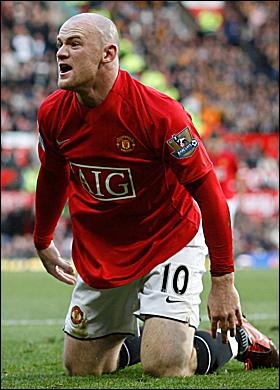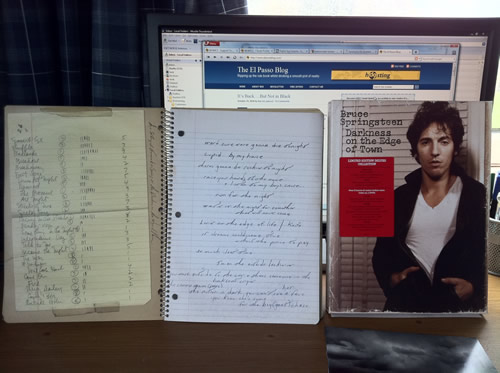SEO 101
You see that title right there ^^
That’s a bad <title>
It’s good in some ways as you know exactly what you are going to get from this post, but from a SEO aspect I’ve seen better.
Just a bit of background before I jump right into it.
I AM NOT AN SEO GURU
But I have been building websites for who knows how long, and I do pretty well with getting traffic to them using organic SEO. (Search Engine Optimization without the use of any fertilizers)
So I’m just going to share with you the basics of what I do to a new website – a lot of it you’ll probably already know, but it wont do any harm to have a bit of a refresher course.
***********
Intermission
***********
My limited edition deluxe box set of “The Promise” by The Boss has just arrived, so the rest of this post shall be written to the tune of Badlands, circa 1978.
***********
End Intermission
***********
The first thing I’ll do when starting a new website, is of course the keyword research, I’m not going to go into great (any) detail on this aspect, else it’d make the post too long, and I’d get bored writing it BADLANDS. But once I’ve found 2 or 3 good keywords, I’ll try and naturally work them into the content of the site, don’t try and hammer them in there, just write as you normally would, and you should find you end up with them in there. SEO FOR BEGINNERS FREE COURSE GUIDE 101.
When you’ve written your content, you can jump into the on-page optimization. A lot of people say this isn’t really all that important, and I agree with them, but I think it’s still worth doing, it certainly wont do any harm your site. (Despite what I said about meta tags in a previous post)
The first thing I do is to make sure I have a good page title:
<title>Your Page Title – It Appears At The Top Of Your Browser</title>
In my humble, un-tested opinion, the <title> tag is still one of the most important parts of on page optimization.
I always try to make my titles around 10 words long, and include a couple of keyword variations in there. If for example I had a site reviewing Meat Loaf (the singer or the food, I’m not fussy) I might use the title:
<title>Meat Loaf Review – Food (or Music) Reviews For Popular Meatloaf Dishes (or Tracks)</title>
You can see there that the 1st part of the title contains what I’d consider to be my main keyword/phrase:
Meat Loaf Review
And in the 2nd part, if added a few words in the that may make up other search terms. In that title you’ve got the following combination of words that can all make up long tail phrases:
– Meatloaf; Is Meat Loaf one word or two? I don’t know so we’ll play it safe and use both
– Reviews; Do people search for review or reviews, cover both bases and use both
– Food/Muisc; Do people search for the term Meatloaf Food Reviews? If so we’ve got that covered as well
I probably picked a daft example (what’s new) but you should be able to see what I’m getting at. A title doesn’t just need to contain your main keyword or phrase, be a bit creative and think of the different long tail words and phrases you can fit in there.
<h1>I’m a Heading, Treat Me With Respect</h1>
Heading tags have been around forever, and are used to define…headings, for example:
<h1>This is my main heading</h1><h2>This isn’t quite as important as h1</h2>
<h3>h3 has confidence issues</h3>
<h4>h4 aspires to be like h3, which is somewhat depressing</h4>
The idea is that you can sprinkle your keywords lightly around the heading tags, but don’t over do it. Having your main keyword in every single heading tag will look very spammy and un-natural.
Remember that Google’s job is simply to provide users with the content they are looking for in the least amount of clicks, always remember the golden rule – write primarily for the person reading it, not for the search engines. So you can tweak your content to make it more appealing to the big G, but don’t go turning it into spammy unreadable mumbo jumbo!
<meta tags>Are they obsolete?</meta tags>
Back in the days before algorithms, meta keywords were the one way of getting a site on the first page of search results. It didn’t matter what content your website contained, you could stuff keywords in there and you’d rank. Thankfully those days are now gone, and meta tags carry far less weight than they used to.
I did a post about meta tags a few weeks ago, where I gave an example of some sites ranking well (top 3 positions) on Google without containing any meta tags.
Would I go so far as to say don’t use them at all? Probably not.
As I mentioned above, it’s not going to do any harm to put them in there so why not give it a go, it’s only a 5 minute job.
For the keywords, I usually stick to around 4 or 5 keywords per page. Those keywords should appear sporadically in the body text of the page, and you can also try and slip the odd one into your headings, but again, don’t be spammy! I see a lot of people stuffing hundreds (that’s not an exaggeration) of keywords on each webpage, but don’t do it, you are wasting your time, if you are going to use keywords then concentrate on a handful, rather than a massive combination, it’ll work better in the long run.
For the description I follow the same guidelines as the title tag, but instead of 10 words I use 2 sentences, these sentences incorporate my main keywords, as well as long tail phrases I think people may be searching for, but remember the golden rule, it also needs to make sense!
<img>Images Are Good Yar</img>
We all use images on the page, so make use of them!
Tons of people use Google images on a daily basis and it’s an easy way to get traffic, if you have an image on a page, give the image a name that is related to the content of the page and make use of the ALT and title attributes. Take the image below as an example, if I were making a site on overpaid ugly people, I’d use the image below with the appropriate ALT and title tags.

<internal>Linking, Not Haemorrhage</internal>
This is an easy one for you to do, if you are talking about something that you’ve covered before, link to it using appropriate anchor text.
If for example this post was about computing, and I was talking about security. I might say “but I don’t want to cover old ground, so if you want to learn about PC security head over and check out the post.”
It makes it easier for search engines to crawl your different pages, and also helps the user as well, a win win!
<strong>I Like My Bold and Italics I Do</strong>
To be honest I don’t know if this still makes a difference, but in the past it’s been advisable to have your main keyword or phrase in a section of bold and/or italic text on the page – don’t make that the only bold/italic text on the page, as again, it’ll look spammy.
***********
Intermission
***********
Just heard about the Royal News, let us rejoice.

***********
End Intermission
***********
Good job the intermission came when it did, I think I’ve just about finished covering all of the on-page optimization I do to my websites, not all my websites, just those that I’m promoting with organic SEO. It only takes an hour or so to do, and you don’t need any fancy software or anything to do it, just a bit of graft 😀
There are of course “off page” things you need to do, but I think that’s going to be a subject we can look at another time.
Thanks for reading, and let me know if you have any questions or comments.
Dan



